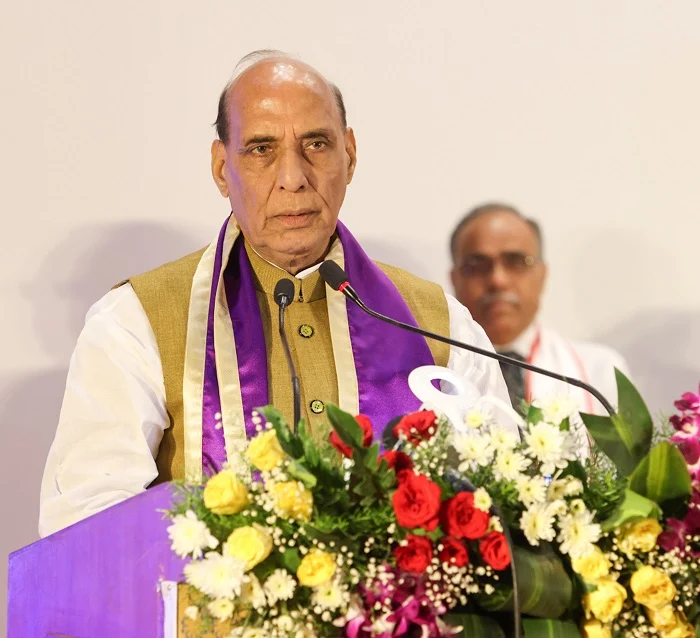

Defence Minister Rajnath Singh called for harnessing the country's full potential to realise PM Modi's dream of a strong, prosperous, self-reliant and developed India by 2047 (Image courtesy: PIB)
Defence Minister Rajnath Singh on Monday called upon the institutions such as the Defence Institute of Advanced Technology (DIAT) to come up with new innovations which are not only useful to the defence sector but equally effective for civilians as well.
Exhorting research institutes to speed up activities in advanced technology and achieve progress to make India fully capable of dealing with emerging threats related to cyber and space, Singh stated that science and technology and methods of warfare are evolving at a rapid pace.
“If our adversary possesses more advanced technologies, it can be a cause of concern for us in the future. There is an urgent need to move fast towards technological advancements in line with the changing times,” he said while addressing the 12th convocation ceremony of DIAT in Pune on Monday.
“This responsibility lies with our institutions. Defence sector is not a stagnant lake, but a flowing river. Just as a river, we need to keep surging ahead overcoming obstacles,” Singh added.
Sharing insights on the continuously changing political and economic equations among nations in the current global scenario, the Defence Minister said that there is a need to make fast progress in advanced technology to deal with non-kinetic or contactless warfare in addition to conventional methods.
He elaborated on the government’s vision to achieve ‘Aatmanirbharta’ in defence, terming it as the “most crucial” component essential for strengthening the security apparatus of the country, but at the same time made it clear that self-reliance does not mean isolation from the world.
“Today, the world has become a global village and isolation isn’t possible. The aim of self-reliance is to meet the needs of the Armed Forces by building necessary equipment/platforms with our own capacity while fulfilling the security requirements of our friendly countries,” he said.
He told the gathering that dependence on the import of defence equipment can become a hindrance to India’s strategic autonomy, which is the main reason why the Modi government is making all-out efforts to achieve self-reliance in the sector.
“Without self-reliance, we cannot take independent decisions on global issues in line with our national interests. More equipment we import; more adverse impact it will have on our balance of trade. We aim to become a net exporter instead of net importer. It will not only strengthen our economy, but increase employment opportunities.”
Singh listed out a number of steps taken by the Ministry of Defence to promote self-reliance, including the promulgation of four positive indigenisation lists for Armed Forces comprising 411 systems/equipment. In addition, fourth positive indigenisation lists for DPSUs have been issued, comprising a total of 4,666 strategically-important Line Replacement Units/Sub-systems/Spares & Components. He termed these steps as a testament to the steadfast commitment of the government to attain ‘Aatmanirbharta’ in defence.
Singh also threw light on the special emphasis being laid by the government in the field of innovation. He pointed out that today India is the second largest hub for start-ups and the Ministry of Defence is constantly receiving innovative ideas.
“Over 6,000 applications were received in the last seven editions of the Defence India Start-up Challenge, which indicates that Indian start-ups are contributing significantly in the pursuit of self-reliance in the defence sector. Now more patents are being filed, which is a sign of the innovative prowess,” the Minister said.
India is manufacturing rifles, BrahMos missiles, Light Combat Aircraft and indigenous aircraft carriers on its own. Singh emphasised that defence exports have increased manifold in recent years to approximately Rs 16,000 crore in 2022-23 from Rs 900 crore in 2014. India is exporting defence equipment to many countries, with many showing interest and faith in the country’s manufacturing capabilities.
The Defence Minister called for harnessing the country’s full potential to realise PM Modi’s dream of a strong, prosperous, self-reliant and developed India by 2047.
As India continues to get World support against the Pahalgam Terror attack that killed 26…
Union Minister of Industry and Supply Piyush Goyal on Saturday highlighted the success of a…
In a display of outrage following the Pahalgam terror attack, thousands from the Indian community…
In a continued crackdown following the Pahalgam terror attack, security forces and Jammu and Kashmir…
In a massive statewide crackdown, over 550 illegal immigrants from Bangladesh were detained in Ahmedabad…
The Deputy Chief of the Main Operations Directorate of the General Staff of the Russian…